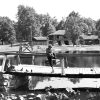calsfoundation@cals.org
Forrest William “Frosty” England (1912–2002)
Forrest William “Frosty” England was an outstanding high school and college football coach from 1935 through 1957. As the coach of the Indians at what is now Arkansas State University (ASU) in Jonesboro (Craighead County), he compiled the fifth-best career winning percentage and fifth-best in most wins in the program’s history.
Forrest England was born on October 19, 1912, in Vandalia, Illinois. He was one of three sons of William J. England and Nora L. Weekly England. After graduating from the local high school, he attended Illinois College in Jacksonville, where he participated in football, basketball, and track. He lettered two years in football and one in track.
England graduated from Illinois College in 1935 with a bachelor’s degree. Years later, he earned a master’s degree from the University of Missouri. After his college graduation, he spent the next ten years coaching in Illinois and Missouri at Perry High, Waverly High, Maroa High, Jacksonville High, and finally at University City High in Missouri. England-led teams won almost seventy-two percent of their games.
England married Louis Batterson around 1935 while attending Illinois College. They had two sons.
In 1946, Arkansas State College (ASC) in Jonesboro was looking for an answer to a struggling football program that had not had a winning season since 1939. ASC coach and athletic director Ike Tomlinson was able to hire the successful high school coach to his first college position.
England had little to build on, since the school did not field a team from 1942 through 1944 due to World War II player shortages. His team began the 1946 season with two losses and a tie. However, the team would finish strong with an overall 4–3–3 record, ASC’s first winning season since 1939. England built on this early success, and by the end of the 1950 season when ASC departed the Arkansas Intercollegiate Conference (AIC), he had compiled a five-year record of 23–16–7. England-led teams posted only one losing season, a 4–5 record in 1949.
ASC began competing as an independent starting with the 1951 season. The independent route in college football presents many challenges and often results in poor seasons. That could not be said for ASC. Over the next three seasons, the team won twenty-six games, posting ten wins in 1951 and eight wins in both 1952 and 1953. In 1951, ASC participated in post-season play for the first time in school history. That season, they played in both the Refrigerator Bowl and the Tangerine Bowl, defeating Camp Breckinridge in the first and losing to Stetson in the latter. The team returned to the Refrigerator Bowl in 1952, losing to Western Kentucky, and tied East Texas State in the 1954 Tangerine Bowl.
Just as the football program was gaining momentum, a larger football program with more assets came calling. After the 1953 season, the third in a row in which ASC won at least eight games, England accepted the head coaching and athletic director position at the University of Toledo in Ohio. England had coached eight seasons at ASC. His teams posted a 49–21–9 record, with no losing season, and participated in four post season bowls.
England was named the head football coach and athletic director at the University of Toledo on January 19, 1954. England’s first season as the Toledo head coach was a success, finishing with a 6–2–1 record and two players being drafted into the National Football League (NFL) at the end of the season. England was also runner-up as the Ohio coach of the year, losing out to Ohio State University coach Woody Hayes. England did not maintain the success of his inaugural season at Toledo, however. In season two, the Rockets finished with a 3–5–1 record, England’s second losing season as a college coach.
In March 1956, England suffered a heart attack. He took a leave of absence from coaching but still maintained his athletic director duties. The next season, under interim coach Jack Morton, the Rockets fell to a 1–7–1 record. England hoped to return to the field, but after another heart attack in 1957, the university did not renew his contract. England was surprised and upset by his nonrenewal and so embittered that he did not return to the university until he and Ike Tomlinson were invited by Toledo’s athletic director to attend a game against Arkansas State University in 1992. Years later, England said, “God, I loved football. I think I’d still be coaching…if not for the heart attacks.” During his ten years of college coaching, his teams won almost seventy-five percent of their games.
England retired from coaching and entered the field of real estate in Toledo. He worked for Grogan Realty for twenty-four years, many of those as vice president. In 1966, he was named Salesman of the Year by the staff of the Toledo Blade. In 1981, he started his own real estate company, from which he retired in 2001.
England received many honors for his coaching success. He was inducted into the Arkansas State University Hall of Honor in 1983 and the Illinois College Hall of Fame in 1984, the same year the college named its football stadium in honor of England and his wife. He received an honorary doctorate in 1992 from Illinois College.
England was a proponent of the Split T offense and published two books on the subject, Coaching the Split T in 1948 and Coaching the T from A to Z in 1952. He also published almost thirty articles on the subject of football.
England died on June 25, 2002, at Toledo’s senior care facility Anchors at Sylvania. England donated his body for medical research.
For additional information:
“Ex-UT Football Coach Was Successful Realtor.” Toledo Blade, June 26, 2002, p. 4B.
“Forrest W. England.” Toledo Blade, June 26, 2002, p. 5B.
Hackenberg, Dave. “Frosty’s Thawed Out.” Toledo Blade, September 5, 1992, pp. 19, 22.
Mike Polston
CALS Encyclopedia of Arkansas






Comments
No comments on this entry yet.